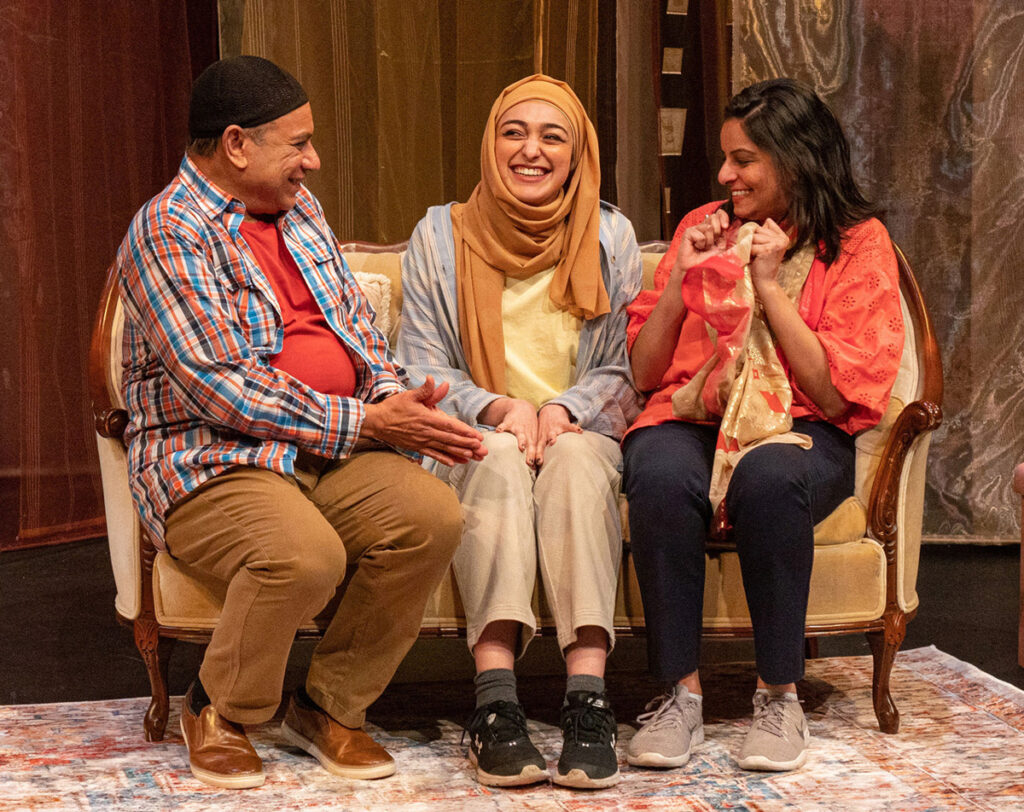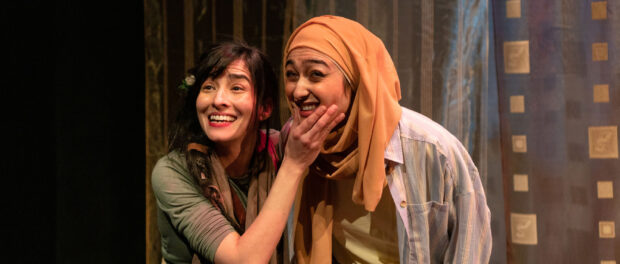Review: The Rishta
Samah (Eman Ayaz) is a ball of energy and schemes. With bright eyes and huge sweeps of her arms she informs her video-game playing brother Kamran (Adolyn H. Dar) that she’s met the love of her life: Hussain, an artist like herself. Even better, they’re going to get married. So begins Rishta, a play written by best-selling novelist Uzma Jalaluddin and directed by Masha Bashmakova.
Of course, the path to love in never smooth and Samah faces a major problem. Her parents will never approve the suitor. He’s the wrong type of Muslim – from Morocco, an Arabic–French speaker, and career-wise, he’s an inappropriate choice for their med-school bound daughter. And that’s the other thing. Samah’s parents think she is headed towards medical school. She isn’t. She too has opted for an arts degree after failing first-year chemistry. Samah despairs that there is no way her “traditional” South East Asian parents will accept her boyfriend or her situation.
So begins a scheme that involves hiring Badra (Nora Guerch), a matchmaker whose job it is to present Samah’s parents with three terrible suitors. After meeting such horrible prospects, Samah believes they will be more inclined to accept Hussain. Kamran is supposed to run interference. However, Kamran and Samah’s parents have their own secrets and everyone is holding back something. Will Samah get her happily-ever-after or, at the very least, parental approval?

Rishta is a zany comedy, with plenty of one-liners and situational humour woven into the story. Perhaps its best feature is showcasing the concerns and culture of a South East Asian Muslim Canadian-immigrant family in a way that is not heavily dramatic or humourlessly dry. It’s the imperfection of humans within their culture that is delightful to spend time with, whether it is having a crumpled prayer mats or not entirely knowing how to indicate rejection through the serving of chai tea. Although quite light, the show taps into some deeper themes, notably the expectations placed on immigrant families and their public appearance, as well as belonging and acceptance by one’s own.
Production-wise, it is sometimes difficult to hear the actors, which is a shame, because it means some of the witty dialogue is lost. The script has a few problems as well. For one thing, it runs a bit long. A number of scenes repeat the same information. Also, Kamran’s situation isn’t well-flushed out and that makes it difficult to appreciate his circumstances or his relationship to his parents. Finally, the two secrets that Samah struggles with are treated as one and it would be better to address them separately.
However, there are things to commend in the production. One thing I especially found creative was the way in which two grandmother spirits comment like a Greek chorus on the actions of their children and grandchildren. Using a sheer silk curtain to shield them from the action of the living world, they speculate on the way expectations and social roles break families apart. They see the worries of the living from a distance and so relate to the immediacy of life with a long-range perspective. I also like the way that the suitors are all taken on by a single actor, Subhan Aref, who plays each with commitment and gusto to each distinct identity.
I am also impressed by the performances of the actors playing Samah’s parents, Sehar Manji and Ivan Smith. There characters are a little more toned down than the others, and they are a little easier to connect with. Their first appearance is for me the most memorable moment of the play.
All in all, the show is sweet and light with all the silly romance of hidden identities, secret lovers, decoy suitors, rejecting parents, and even a bit of dancing. Seems like a Bollywood film! Overall, though, Rishta runs a little long for its messages and never addresses the thornier aspects of how limiting and damaging parental and child expectations are.
The Rishta is at The Centaur Theatre (435 St. François-Xavier) until April 8. Tickets HERE.






